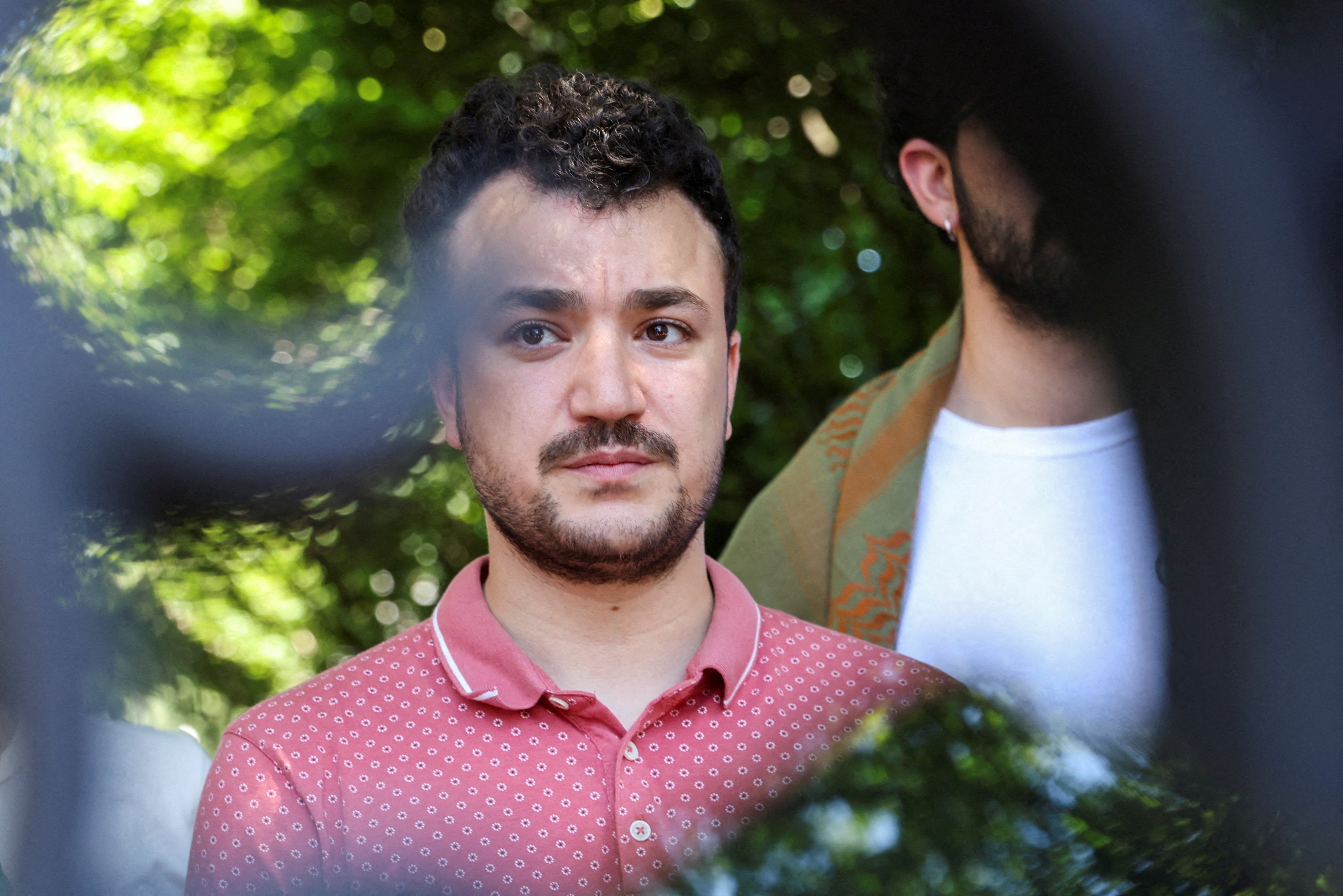A federal judge has denied the Trump administration's move to dismiss a case from Mahmoud Khalil, a Columbia University student activist who was detained by immigration enforcement agents and jailed in Louisiana over his involvement in pro-Palestine demonstrations on campus.
Khalil is currently detained in a Louisiana facility, more than 1,300 miles from New York, and has been placed in deportation proceedings.
In his order Wednesday, New York District Judge Jesse Furman moved the case to New Jersey, where Khalil was detained at the time his lawyers filed for his release.
Khalil has remained in Immigration and Customs Enforcement detention for more than a week as his lawyers challenge the “targeted, retaliatory detention and attempted removal of a student protester because of his constitutionally protected speech.”
The arrest of Khalil, a lawful permanent resident married to a U.S. citizen who is eight months pregnant with their child, has sparked international outrage and fears that the administration is moving to crush political dissidents, starting with campus demonstrations against Israel’s devastating campaign in Gaza and U.S. support.
Administration officials have accused Khalil of “antisemitic activities” and supporting Hamas, which he has denied. Officials concede he has not committed any crime, but claim he can be removed over what they characterize as “potentially serious adverse foreign policy consequences.”
His attorneys argue his arrest and detention — and attempted removal from the country, which is currently blocked — have violated his First Amendment right to freedom of speech and his Fifth Amendment right to due process of law, among other claims.
“At the heart of this case is the important question of whether and under what circumstances the government may rescind a person’s lawful permanent resident status and remove him from the United States,” Furman wrote.
The judge said a transfer of Khalil’s case, “rather than dismissal, is the path that courts usually take in these circumstances.”
“That path is all the more appropriate in this case,” as a dismissal of Khalil’s lawsuit challenging his arrest would toss Judge Furman’s earlier court order preventing the government from deporting him while his legal challenge plays out, the judge wrote.
“In many ways, this is indeed an exceptional case, and there is a need for careful judicial review,” according to Furman.
“Such judicial review is especially critical when, as here, there are colorable claims that the executive branch has violated the law or exercised its otherwise lawful authority in an arbitrary and discriminatory manner,” he added. “And in an exceptional case, it is all the more important for a court to apply well-established principles to the facts, lest emotions or passions interfere with reasoned analysis; that is the essence of the rule of law.”
The judge said he did not believe that Khalil’s transfer “was done to prevent his lawyer from promptly challenging his detention in federal court,” and that his movements from facility to facility “do not appear to be that unusual.”
But requiring Khalil to relitigate his case in Louisiana “would also mean litigating far from his lawyers, from his eight-months-pregnant wife, and from the location where most (if not all) of the events relevant to his petition took place,” the judge wrote.
A New Jersey court is “the one and only district” that could hear a challenge for his release, as well as his other claims of constitutional violations, he said.

Khalil, who is Palestinian, grew up in a refugee camp in Syria. He entered the United States on a student visa in 2022 to pursue a master’s degree in public administration, which he completed last year. His anticipated graduation date is May 2025.
He became a lawful permanent resident in 2024.
Khalil “has called Israel’s actions in Gaza a genocide and criticized Columbia University for, in his view, financing and in other ways facilitating such violence,” his attorneys wrote in court filings last week.
On March 8, plainclothes federal agents followed Khalil and his wife into the lobby of an apartment building, and two other officers approached from inside the building, the filing states. They never produced a warrant, according to his attorneys.
He was moved to a detention facility in New Jersey and then flown to Louisiana the next day.
“I am a political prisoner,” Khalil said in a public statement published March 19.
The Trump administration “is targeting me as part of a broader strategy to suppress dissent” in which “visa-holders, green-card carriers and citizens alike will all be targeted for their political beliefs,” he said.
Ukraine war live: Zelensky and Trump speaking after Russia launches fresh strikes
Trump ends ban on ‘segregated facilities’ in federal contracts: Live updates
ICE says ‘many’ Venezuelans deported to El Salvador prison have no criminal record
Inside the El Salvador mega-prison where Trump is sending hundreds of immigrants
Jackie Robinson’s page on Pentagon website removed amid DEI purge
Trump and Zelensky speak after Putin breaks word on infrastructure attacks







